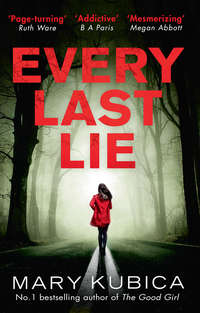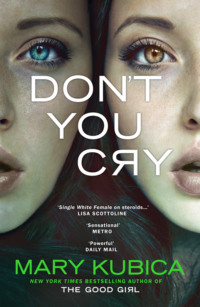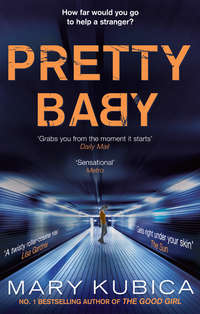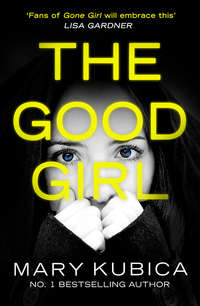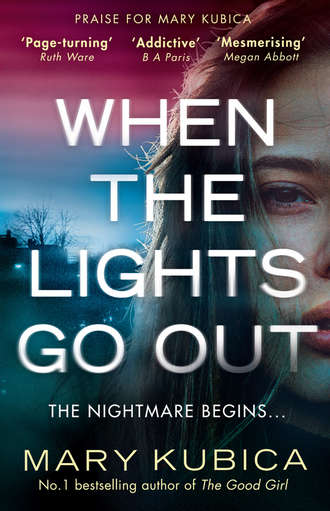
Полная версия
When The Lights Go Out: The addictive new thriller from the bestselling author of The Good Girl
“Bad dreams?” I ask, worried that nightmares might torment her sleep.
“I can’t say for sure,” the nurse says. She repositions Mom on her right side, tucking a rolled-up blanket beneath her hip, checking the color of her hands and feet. “No one even knows for sure why we dream,” the nurse tells me, adding an extra blanket to my bed in case I catch a draft in my sleep. “Did you know that?” she asks, but I shake my head and tell her no. “Some people think that dreams serve no purpose,” she adds, winking. “But I think they do. They’re the mind’s way of coping, of thinking through a problem. Things we saw, felt, heard. What we’re worried about. What we want to achieve. You want to know what I think?” she asks, and without waiting for me to answer, she says, “I think your mom is getting ready to go in that dream of hers. Packing her bags and saying goodbye. Finding her purse and her keys.”
I can’t remember the last time I’d dreamed.
“It can take up to an hour to kick in,” the nurse says, and this time I know she means the medicine.
The nurse catches me staring at Mom. “You can talk to her, you know?” she asks. “She can hear you,” she says, but it’s awkward then. Talking to Mom while the nurse is in the room. And anyway, I’m not convinced that Mom can really hear me, so I say to the nurse, “I know,” but to Mom, I say nothing. I’ll say all the things I need to say if we’re ever alone. The nurses play Mom’s records some of the time because, as they’ve told me, hearing is the last thing to go. The last of the senses to leave. And because they think it might put her at ease, as if the soulful voice of Gladys Knight & the Pips can penetrate the state of unconsciousness where she’s at, and become part of her dreams. The familiar sound of her music, those records I used to hate when I was a kid but now know I’ll spend the rest of my life listening to on repeat.
“This must be hard on you,” the nurse says, watching me as I stare mournfully at Mom, taking in the shape of her face, her eyes, for what might be the last time. Then she confesses, “I know what it’s like to lose someone you love.” I don’t ask the nurse who, but she tells me anyway, admitting to the little girl she lost nearly two decades ago. Her daughter, only three years old when she died. “We were on vacation,” she says. “My husband and me with our little girl.” He’s her ex-husband now because, as she tells me, their marriage died that day too, same day as their little girl. She tells me how there was nothing Madison loved more than playing in the sand, searching for seashells along the seashore. They’d taken her to the beach that summer. “My last good memories are of the three of us at the beach. I still see her sometimes when I close my eyes. Even after all these years. Bent at the waist in her purple swimsuit, digging fat fingers into the sand for seashells. Funny thing is that I have a hard time remembering her face, but clear as day I see the ruffles of that purple tulle skirt moving in the air.”
I don’t know what to say. I know I should say something, something empathetic. I should commiserate. But instead I ask, “How did she die?” because I can’t help myself. I want to know, and there’s a part of me convinced she wants me to ask.
“A hit-and-run,” she admits while dropping into an empty armchair in the corner of the room. Same one that I’ve spent the last few days in. She tells me how the girl wandered into the street when she and her husband weren’t paying attention. It was a four-lane road with a speed limit of just twenty-five as it twisted through the small seaside town. The driver rounded a bend at nearly twice that speed, not seeing the little girl before he hit her, before he fled.
“He,” she says then. “He.” And this time, she laughs, a jaded laugh. “I’ll never know one way or the other if the driver was male or female, but to me it’s always been he because for the life of me I can’t see a woman running her car into a child and then fleeing. It goes against our every instinct, to nurture, to protect,” she says.
“It’s so easy to blame someone else. My husband, the driver of the car. Even Madison herself. But the truth is that it was my fault. I was the one not paying attention. I was the one who let my little girl waddle off into the middle of the street.”
And then she shakes her head with the weariness of someone who’s replayed the same scene in her life for many years, trying to pinpoint the moment when it all went wrong. When Madison’s hand slipped from hers, when she fell from view.
I don’t mean for them to, but still, my eyes fill with tears as I picture her little girl in her purple swimsuit, lying in the middle of the road. One minute gathering seashells in the palm of a hand, and the next minute dead. It seems so tragic, so catastrophic, that my own tragedy somehow pales in comparison to hers. Suddenly cancer doesn’t seem so bad.
“I’m sorry,” I say. “I’m so sorry,” but she shoos me off and says no, that she’s the one who should be sorry. “I didn’t mean to make you sad,” she says, seeing my watery eyes. “Just wanted you to know that I can empathize. That I can relate. It’s never easy losing someone you love,” she says again, and then stands quickly from the armchair, gets back to tending to Mom. She tries to change the subject. “Feeling tired yet?” she asks again, and this time I tell her I don’t know. My body feels heavy. That’s as much as I knew. But heavy and tired are two different things.
She suggests then, “Why don’t I tell you a story while we wait? I tell stories to all my patients to help them sleep.”
Mom used to tell me stories. We’d lie together under the covers of my twin-size bed and she’d tell me about her childhood. Her upbringing. Her own mom and dad. But she told it like a fairy tale, like a once upon a time kind of story, and it wasn’t Mom’s story at all, but rather the story of a girl who grew up to marry a prince and become queen.
But then the prince left her. Except she always left that part out. I never knew if he did or if he didn’t, or if he was never there to begin with.
“I’m not your patient,” I remind the nurse but she says, “Close enough,” while dimming the overhead lights so that I can sleep. She sits down on the edge of my bed, pulling the blanket clear up to my neck with warm, competent hands so that for one second I envy Mom her care.
The nurse’s voice is low, her tone flat so she doesn’t wake Mom from her deathbed. Her story begins somewhere just outside of Moab, though it doesn’t go far.
Almost at once, my eyelids grow heavy; my body becomes numb. My mind fills with fog. I become weightless, sinking into the pitted hospital bed so that I become one with it, the bed and me. The nurse’s voice floats away, her words themselves defying gravity and levitating in the air, out of reach but somehow still there, filling my unconscious mind. I close my eyes.
It’s there, under the heavy weight of two thermal blankets and at the sound of the woman’s hypnotic voice, that I fall asleep. The last thing I remember is hearing about the snarling paths and the sandstone walls of someplace known as the Great Wall.
When I wake up in the morning, Mom is dead.
I slept right through it.
eden
May 16, 1996 Egg Harbor
Aaron showed me the house today. I’m in love with it already—a cornflower blue cottage perched on a forty-five-foot cliff that overlooks the bay. Pine floors and whitewashed walls. A screened-in porch. A long wooden staircase that leads down to the dock at the water’s edge where the Realtor promised majestic sunsets and fleets of sailboats floating by. Quaint, charming and serene. Those are the words the Realtor used. Aaron, as always, didn’t say much of anything, just stood on the balding lawn with his hands in the pockets of his jeans, staring out at the bay, thinking. He’s recently taken a job as a line cook at one of the restaurants in town, a chophouse in Ephraim. The cottage will more than cut his commute time in half. It’s also a steal compared to our current mortgage, and set on two acres of waterfront land that spans the heavily wooded backcountry to the rocky shores of Green Bay.
And there’s a garden. A ten-by-twenty-or thirty-foot space overrun with brambles and weeds. It’s in need of work, but already Aaron has promised raised beds. There is a greenhouse, a sorry sight if I’ve ever seen one, set in a sunnier patch of the yard where the grass still grows. Small, shedlike, with aged glass windows and some sort of clear, corrugated roof meant to attract the sun. The door hangs cockeyed, one of its hinges broken. Aaron took a look and said that he can fix it, which comes as no surprise to me. There isn’t a thing in this world that Aaron can’t fix. Cobwebs cling to the corners of the room like lace. Already I’m imagining rows and rows of peat pots of soil and seed soaking up the sun, waiting to be transported into the garden.
Nearby, a swing hangs from the mighty branch of a burr oak tree. It was the tree that cinched it for me. Or maybe not the tree itself, but the promise of the tree, the notion of children one day causing ruckus and mayhem on the tree’s swing, three feet of lumber fastened to the branch with a sturdy rope. I envision them climbing deep into the divots of the tree’s trunk and laughing. I can hear them already, Aaron’s and my unborn children. Laughing and screaming in delight.
Aaron asked if I loved it as much as him, and I didn’t know if he meant whether I loved the cottage as much as I love him, or if I loved the cottage as much as he loves the cottage, but either way I told him I did.
Aaron left the Realtor with our bid. It’s a buyer’s market, he said, trying to finagle the asking price down a good 10 percent. Me, I would have paid asking price, too afraid to lose the cottage otherwise. Tomorrow we’ll know if it’s ours.
Tonight I won’t sleep. How is it possible to love something so much, to want something so badly, when only hours ago I didn’t know it existed?
July 1, 1996 Egg Harbor
The boxes are plentiful. There is no end to the number of cardboard boxes the movers carry through the front door, delivering them to their marked rooms—living room, bedroom, master bath—stomping across our home in dusty work boots. Sixteen hundred square feet of space needing to be filled as Aaron and I divvied up our gender-appropriate tasks, he directing the movers with couches and beds while I unpacked and washed the dishes by hand and placed them in the cabinets. I watched the many laps they took, each man’s head beginning to glimmer with sweat. Aaron’s too, though he hardly carried a thing, and yet the authority in his voice, the obvious clout as grown men trailed him through our home, heeding his every word, was enough to catch my eye. I watched him round the home time and again, wondering how I was so lucky to have him all to my own.
It wasn’t like me to be lucky in love. Not until I met Aaron. The men who came before him were deadbeats and drifters, bottom-feeders. But not Aaron. We dated for a year before he proposed. Tomorrow we celebrate two years. Soon there will be kids, a whole gaggle of little ones spinning circles at our feet. As soon as we’re settled, Aaron always said, and now, as my eyes assess the new home, the sprawling landscape, the sixteen hundred square feet of space, three bedrooms—two vacant and left to fill—I realize the time has come and like clockwork, something inside me starts to tick.
When the movers’ backs were turned, Aaron kissed me in the kitchen, pinning me against the cabinets, hands gripping my hips. It was unasked for and yet very much wanted as he kissed with his eyes closed, whispering that all of our dreams were finally coming true. Aaron isn’t one to be sentimental or romantic, and yet it was true: the cottage, his job, leaving the city. We’d both wanted to get away from Green Bay since the day we were married, his hometown and my hometown, so that two sets of parents couldn’t show up at our door on any given day, unsolicited, waging a secret battle as to which in-law could occupy the most of our time. We hadn’t gone far, sixty-seven miles to be precise, but enough that visits would be preempted with a simple phone call.
Tonight we made love on the living room floor to the glow of candlelight. The electricity had yet to be turned on and so, other than the dance of candlelight on the whitewashed walls, the house was dark.
Aaron was the first to suggest it, discontinuing my birth control pill, as if he knew what I was thinking, as if he could read my mind. It was as we lay together on the wide wooden floorboards staring out the open windows at the stars, Aaron’s prowling hand moving across my thigh, contemplating a second go. That’s when he said it. I told him yes! that I am ready for a family. That we are ready. Aaron is twenty-nine. I am twenty-eight. His paycheck isn’t extravagant, and yet it’s enough. We aren’t spendthrifts; we’ve been saving for years.
And even though I knew it wasn’t possible yet, the pill in my system nipped any possibility of pregnancy in the bud, I still imagined a creature no bigger than a speck starting to take form as Aaron again let himself inside me.
July 9, 1996 Egg Harbor
Our days begin with coffee on the dock, bare feet dangling over the edge, downward toward the bay. The water is cold, and our feet don’t reach anyway. But as promised, there are sailboats. Aaron and I spend hours watching them pass by, as well as sandpipers and other shorebirds that come to call, their long legs wading through the shallow water for a meal. We stare at the birds and the sailboats, watching the sun rise higher into the sky, warming our skin, burning off the early-morning fog. Heaven on earth, Aaron says.
As we sit on the dock, Aaron tells me about his nights at the chophouse that steals him from me for ten hours at a time. About the heat of the kitchen, and the persistent noise. The rumble of voices calling out orders in sync. The sputter of boneless rib eye on the grill, the dicing and hashing of vegetables.
His voice is placid. He doesn’t complain because Aaron, ever easygoing Aaron, isn’t one to complain. Rather he tells me about it, describing it for me so that I can see in my mind’s eye what he’s doing when he’s away from me for half the day. He wears a white chef jacket and black chef pants and a cap, something along the lines of a beanie that is also white. Aaron’s been assigned the role of saucier, or sauce chef, one that’s new to him, but no doubt comes with ease. Because this is the way it is with Aaron. No matter what he tries his hand at, things always come with ease.
Our property is fringed by trees so that as we sit on the deck’s edge, Aaron and me, it feels as if we’re all alone, partitioned from society by the lake and the trees. If we have neighbors, we’ve never seen them. Never laid eyes on them. Never spied another home through the canopy of trees. Never are we disturbed by the sound of voices, but only the colloquy of birds as they perch in the trees and yammer back and forth about whatever it is birds talk about. On occasion the helmsmen will wave a hearty hello from behind the steering wheel of their sailboats, but more often than not they’re too far away to see Aaron and me at the dock’s edge, feet dangling southward, holding hands, sitting in silence, listening to the breeze through the trees.
We’re marooned on an island, stranded and shipwrecked, but we don’t mind. It’s just the way it should be.
Aaron’s work shift begins at two in the afternoon and ends when the last customer leaves and the kitchen is clean, most nights stumbling into bed around midnight or after, smelling of sweat and grease.
But the days are ours to do with as we please.
Last week, Aaron repaired the greenhouse door and we stripped it of cobwebs and bugs. We spent days cultivating the garden and Aaron made good on his promise of raised beds, three feet by five feet by ten inches deep, made of white cedar that will one day house cucumbers and zucchini. But not this year. It’s far too late in the season to grow produce this year and so for now, we buy it from any number of tatty roadside farm stands. We live two miles from town and even though the population around here expands sevenfold in the summer months thanks to a healthy tourist population, outside town it’s still mainly rural, long stretches of open country roads that intersect with nothing but sky.
Instead of planting produce this year, Aaron and I sowed perennial seeds to enjoy next year: baby’s breath and lavender and hollyhocks because all the fences and cottages around here, it seems, are flanked with hollyhocks. We placed them in peat pots of gardening soil in the greenhouse and set them in the sunniest spot we could find. In a month or so, we’ll transplant them to the garden. They won’t bloom for some time, not until next spring. But still, I stand hopeful in the greenhouse, staring at the peat pots, imagining what might be happening beneath the soil’s surface, whether the seeds’ roots are taking hold, pushing down into the soil to anchor the seedling to this world, or if the seed has merely shriveled up and died in there, a dead embryo in its mother’s womb.
As I clear out the last of my birth control pills and run a hand across what I imagine to be my uterus, I wonder what is happening inside there too.
jessie
I had Mom cremated at her request. I carry her around now in a rhubarb-glazed clay urn with a cork in the top, one she bought for herself when the cancer spread. It’s cylindrical and inconspicuous, the cork stuck on with an ample amount of Gorilla Glue so I don’t lose Mom by chance.
Mom had two wishes when she died, ones she let slip in the last brief moments of consciousness before she drifted off to sleep, a sleep from which she would never wake up. One, that she be cremated and lobbed from the back end of the Washington Island Ferry and into Death’s Door. And two, that I find myself and figure out who I am. The second hinged on the esoteric and didn’t make obvious sense. I blamed the drugs for it, that and the imminence of death.
I’m nowhere near accomplishing either, though I filled out a college application online. But I have no plans of parting with Mom’s remains anytime soon. She’s the only thing of value I have left.
I haven’t slept in four days, not since some doctor took pity on me and offered me a pill. Three if you count the one where I nearly nodded off at the laundromat waiting for clothes to dry, anesthetized by the sound of sweaters tumbling around a dryer. The effects are obnoxious. I’m tired. I’m grumpy. I can focus on nothing and my reaction time is slow. I’ve lost the ability to think.
Yesterday, a package arrived from UPS and the driver asked me to sign for it. He stood before me, shoving a pen and a slip of paper up under my nose and I could only stare, unable to put two and two together. He said it again. Can you sign for it? He forced the pen into my hand. He pointed at the signature line. For a third time, he asked me to sign.
And even then I scribbled with the cap still on the pen. The man had to snatch it from my hand and uncap it.
I’m pretty sure I’ve begun to see things too. Things that might not be real, that might not be there. A millipede dashing across the tabletop, an ant on the kitchen floor. Sudden movements, immediate and quick, but the minute I turn, they’re gone.
I keep track of the sleepless nights in the notched lines beneath my eyes, like the annual rings of a tree. One wrinkle for each night that I don’t sleep. I stare at myself in the mirror each day, counting them all. This morning there were four. The surface effects of insomnia are even worse than what’s going on on the inside. My eyes are red and swollen. My eyelids droop. Overnight, wrinkles appear by the masses, while I lie in bed counting sheep. I could go to the clinic and request something else to help me sleep. Some more of the clonazepam. But with the pills in my system, I slept right on through Mom’s death. I don’t want to think about what else I’d miss.
At McDonald’s, I’m asked if I want ketchup with my fries, but I can only stare at the worker dumbly because what I heard was It’s messed up when boats capsize, and I nod lamely because it is disastrous and sad, and yet so out of left field I can’t respond with words.
It’s only when he drops a stack of ketchup packets on my tray that my brain makes the translation, too late it seems because I hate ketchup. I dump them on the table when I go, the mother lode for someone who likes it. On the way out the door I trip, because coordination is also affected by a lack of sleep.
Two hours ago I dragged my heavy body from bed after another sleepless night, and now I stand in the center of Mom’s and my house, deciding which of our belongings to take and which to leave. I can’t stand to stay here much longer, a decision I’ve come to quickly over the last four days. I’ve spoken to a Realtor already, figured out next steps. First I’m to pack up what I want to keep, and then everything else will be sold in an estate sale before some junk removal service tosses the rest of our stuff in the trash.
Then some other family will move in to the only home I’ve ever known.
I’m eyeing the sofa, wondering if I should take it or leave it, when the phone rings. “Hello?” I ask.
A voice on the other end informs me that she’s calling from the financial aid office at the college. “There’s a problem with your application,” she says to me.
“What problem?” I ask the woman on the phone, afraid I’m about to be cited for tax evasion. It’s a likely possibility; I’d left blank every question on the FAFSA form that asked about adjusted gross income and tax returns. I might have lied on the application too. There was a question that asked if both of my parents were deceased. I said yes to that, though I don’t know if it’s true.
Is my father dead?
On the other end of the line, the woman asks me to verify my social security number for her and I do. “That’s what I have,” she says, and I ask, “Then what’s the problem? Has my application been denied?” My heart sinks. How can that be? It’s only a community college. It’s not like I registered for Yale or Harvard.
“I’m sure it’s just a weird mix-up with vital statistics,” she says.
“What mix-up?” I ask, feeling relieved for a mix-up as opposed to a denied application. A mix-up can be fixed.
“It’s the strangest thing,” she says. “There was a death certificate on file for a Jessica Sloane, from seventeen years ago. With your birth date and your social security number. By the looks of this, Ms. Sloane,” she says, and I amend Jessie, because Ms. Sloane is Mom. “By the looks of this, Jessie,” she says, and the words that follow punch me so hard in the gut they make it almost impossible to breathe. “By the looks of this, you’re already dead.”
And then she laughs as if somehow or other this is funny.
* * *
Today I’m looking for a new place to live. Staying in our old home is no longer a viable option because of the residual ghosts of Mom that remain in every corner of the home. The smell of her Crabtree & Evelyn hand cream that fills the bathroom. The feel of the velvet-lined compartments in the mahogany dresser. The chemo caps. The cartons of Ensure on the refrigerator shelf.
I perch in the back seat of a Kia Soul, trying hard not to think too much about the call from the financial aid office. This is easier said than done. Just thinking about it makes my stomach hurt. A mix-up, the woman claimed, but still, it’s hard to grapple with the words you and dead in the same sentence. Though I try to, I can’t push them from my mind. The way she and I left things, I’m to provide a copy of my social security card to the college before they’ll take another look at my application for a loan, which is a problem because I don’t have the first clue where the card is. But it’s more than that too. Because the woman also told me about some death index my name was found on. A death index. My name on a database maintained by the Social Security Administration of millions of people who have died, nullifying their social security numbers so that no one else can use them, so that I can’t use my own social security number. Because, according to the Social Security Administration, I’m dead.


